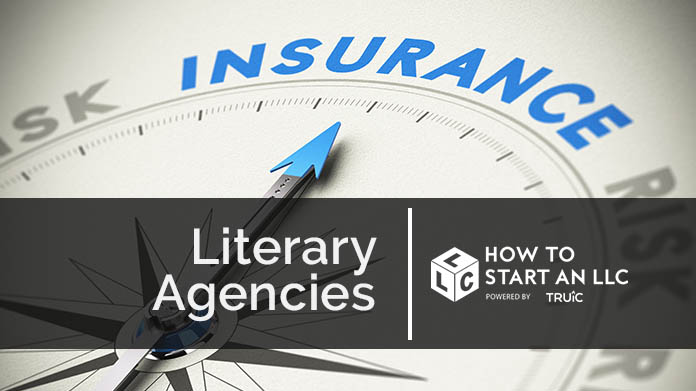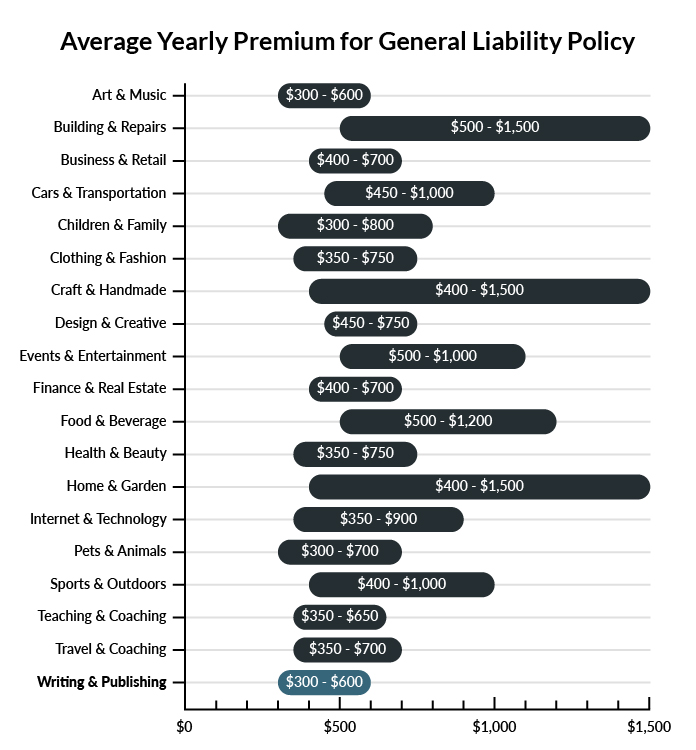Literary Agency Business Insurance
Getting insurance for your literary agency is essential.
Literary agencies need to be protected against things like employment disputes, breach of contract claims, and trademark infringement lawsuits.
For example, an author could accuse your agency of breaking a book publishing contract, or you could be sued for your authors using copyrighted content.
We’ll help you find the most personalized and affordable coverage for your unique business.

Recommended: Ergo Next Insurance is dedicated to matching small businesses with the right policy at the best price.
Best Insurance for a Literary Agency
General liability insurance is — generally speaking — one of the most important insurance policies for literary agencies.
Some of the risks general liability insurance covers are:
- Bodily injury
- Property damage
- Medical payments
- Legal defense and judgment
- Personal and advertising injury
General liability insurance should be high on your list of ways to protect your literary agency financially. Some extra policies to consider include:
- Business income coverage: This type of insurance provides financial protection in case of a significant business interruption, such as a natural disaster or a major power outage. It covers expenses such as lost income, relocation costs, and extra expenses incurred during the recovery period.
- Professional liability insurance: This type of insurance provides protection against allegations of professional negligence or failure to provide proper advice or service. In the event of a lawsuit, legal fees and damages will be covered.
- Workers’ compensation insurance: If one of your employees gets sick or injured due to work they’re performing on the job, this type of insurance will cover their medical bills and related expenses.
When trying to decide on an insurance provider for your literary agency, realize that there are two distinct categories:
- Traditional brick-and-mortar insurers
- Online insurers
Each of these has its own pros and cons. That said, small businesses are generally best suited to online providers like Tivly and Ergo Next. These providers offer high-quality coverage but at a much cheaper rate than traditional insurers. They also can provide coverage faster.
Let’s Find the Coverage You Need
The best insurers design exactly the coverage you need at the most affordable price.
Cost of General Liability Insurance
On average, literary agencies in America spend between $300-$600 per year for $1 million in general liability coverage.
Compare the average cost of general liability insurance for a literary agency to other professional industries using the graph below.
Several factors will determine the price of your policy. These include your:
- Location
- Deductible
- Number of employees
- Per-occurrence limit
- General aggregate limit
You may be able to acquire general liability insurance at a discounted rate by purchasing it as part of a business owner’s policy (BOP) rather than as a standalone policy.
A BOP is a more comprehensive solution that includes multiple forms of coverage, such as business interruption and property insurance.

Find the Best Rate
Discover the best coverage at the lowest rate in our affordable business insurance review.
Common Situations That General Liability Insurance May Cover for a Literary Agency
Example 1: To help gain new clients, you throw a huge holiday party. The icy conditions cause several people to slip and fall in the venue’s parking lot. They are each asking for medical bill reimbursement from you and the venue owner. Your general liability insurance should help cover those costs.
Example 2: As part of the lease agreement for your new office building, you have to show evidence of liability insurance for at least $2 million. Your general liability policy should help fulfill that obligation.
Example 3: During a recent interview, you are critical of another literary agency. Your general liability policy should cover your legal fees and court-awarded damages should they bring a slander case against you.
Other Types of Coverage Literary Agencies Need
While general liability is the most important type of insurance to have, there are several other forms of coverage you should be aware of. Below are some of the most common types of coverage:
Professional Liability Insurance
Clients depend on your expertise and advice. If they feel harmed by your services, they may bring a suit against you for negligence or an error in professional services. Professional liability insurance would pay for legal representation and court-awarded damages, regardless of merit.
You can purchase this insurance, also known as Errors and Omissions insurance, as part of a business owner’s policy (BOP).
Workers Compensation Insurance
The law requires workers compensation coverage for employees. If a team member has a work-related injury, this policy would cover their medical bills and a portion of their lost wages. If the injured employee decides to sue for additional damages, the insurance carrier would cover the cost of your legal fees.
You can purchase workers compensation insurance as a standalone policy.
Commercial Property Insurance
To ensure protection of your professional investments, you should consider a commercial property insurance policy. Should a covered loss occur, this insurance provides coverage for a business’ building and/or its contents.
You can purchase commercial property insurance as part of a business owner’s policy (BOP).
Data Breach Insurance
As a literary agent, your firm stores sensitive information, not yet offered to the public. If a client suffers a loss due to a breach in your computer system, they could hold you liable. While a general liability policy excludes this kind of coverage, you can purchase it for an additional premium.
This type of insurance is also known as cyber attack insurance.
Crime Insurance
While you may have a staff that you know and trust, every business is a target for dishonest people. A standard business owner’s policy, excludes employee dishonesty, fraud, and forgery coverage. Crime insurance ensures coverage should such losses like the above examples occur, reducing the chances of a gap in coverage.
Additional Steps To Protect Your Business
Although it’s easy (and essential) to invest in business insurance, it shouldn’t be your only defense.
Here are several things you can do to better protect your literary agency:
- Use legally robust contracts and other business documents. (We offer free templates for some of the most common legal forms.)
- Set up an LLC or corporation to protect your personal assets. (Visit our step-by-step guides to learn how to form an LLC or corporation in your state.)
- Stay up to date with business licensing.
- Maintain your corporate veil.
Literary Agency Business Insurance FAQ
Yes, absolutely. You will need to first get a quote from an online business insurance provider like Ergo Next Insurance. Ergo Next allows you to then purchase a policy immediately and your coverage will be active within 48 hours.
A typical business owner’s policy includes general liability, business interruption, and commercial property insurance. However, BOPs are often customizable, so your agent may recommend adding professional liability, commercial auto, or other types of coverage to your package depending on your company’s needs.
“Business insurance” is a generic term used to describe many different types of coverage a business may need. General liability insurance, on the other hand, is a specific type of coverage that business owners need to protect their assets.
Yes. Many businesses are legally required to purchase certain types of business insurance (e.g., workers’ compensation) to be able to operate legally.
Regardless of whether your literary agency has to carry specific policies, it’s still essential to buy adequate business insurance if you want to safeguard it from the myriad risks in this industry.
Not necessarily. Certain exceptions may be written directly into your literary agency insurance policy, and some perils may be entirely uninsurable.
Yes, an LLC is meant to create a legal barrier between your business and your personal assets and credit. If you haven’t formed an LLC yet, use our Form an LLC guide to get started.
An LLC doesn’t protect your business assets from lawsuits and liability– that’s where business insurance comes in. Business insurance helps protect your business from liability and risk.